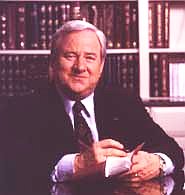 “It’s a show about nothing.”
“It’s a show about nothing.”
In what was probably the most famous self-referential line in the history of television, Seinfeld ‘s Jerry and George attempted to pitch their comedy pilot to NBC. The incredulous execs just stared at each other dumbfounded. How can a TV show be about nothing? Doesn’t something happen? After all, life isn’t about nothing. People actually go out and do things—don’t they?
Last week, some of the most important Christian figures in the 21st century unleashed “An Evangelical Manifesto: A Declaration of Evangelical Indentity and Public Commitment,” a document that attempts to reiterate the values of Evangelicalism for a modern age (though a few of us would claim this was adequately covered by the Lausanne Covenant). The list of signatories on the manifesto includes Os Guinness, Max Lucado, Alvin Plantinga, Leighton Ford, Rebecca Manley Pippert, H. Wayne Huizenga Jr., Stephen Strang, Jack Hayford, Erwin Lutzer, and a former pastor of mine, Stuart Briscoe. That’s a powerful and intriguing mix of backers just in those few names. Many more signed the document.
I would encourage everyone to read the manifesto. I would encourage just as many to consider what might have been.
Beyond the “okay, so we’re apologizing for a lot of stupid stuff we did” tone of “An Evangelical Manifesto,” the one thing a manfesto truly must address is the old question that Francis Schaeffer once used for book title: “How should we then live?”
To be a proper manifesto, a document must not only clarify core foundational truths that the audience of “manifestees” should hold corporately, but it must also reveal its plan. It must give its adherents something to strive for, an inarguable destination outlined by a clear roadmap that will lead true believers forward.
When a real manifesto makes claims, it states them like this:
We believe Truth Statement, therefore we will Intended Consequence by Practical Response.
A case in point:
We believe that Jesus meets the needs of the least of these, therefore we will love the widow and orphan by bringing them into our homes to live with us.
That’s a manifesto statement.
But this is what we get in “An Evangelical Manifesto”:
We call humbly for a restoration of the Evangelical reforming principle, and therefore for deep reformation and renewal in all our Christian ways of life and thought.
Okay, so the Truth Statement there is not immediately obvious, but one can deduce that it might be that Jesus values reformation in all our ways of life and thought.
The Intended Consequence? We call for a restoration of the Evangelical reforming principle. A little high concept, but there it is.
Now does anyone see what’s missing?
Reading “An Evangelical Manifesto” soon reveals to us the problem facing modern day Evangelicalism. Ultimately, for want of any kind of practical response to what is supposedly so dearly believed, Evangelicalism becomes like Seinfeld, ” a show about nothing.”
A real manifesto, especially one devised by some of the most brilliant minds in Christendom today, will not be satisfied with high concepts alone. Yet that is all we read here.
Here’s the $64,000 question: “How does this manifesto alter my daily living?” Answer? It doesn’t. Not at all.
And that’s an enormous loss to us because here Evangelicals have the chance to prove they are more than talk. They have a chance to show that what they believe makes a profound difference in American life. And man, do they drop the ball.
Take the previous statement about reforming principles. In what way does that statement have any impact on the guy who gets up at 5:00 AM, spends almost an hour commuting to work, grinds out ten hours of work while worrying about whether he’ll have that job tomorrow due to a lousy economy, repeats the commute, grabs a fast food dinner, spends about ten minutes of quality time with his kids, five minutes talking with his wife, watches a repeat of Seinfeld or two, checks his e-mail, and goes to bed at 11:00 PM?
It’s not enough to say we believe something and would like to see that something come to fruition. We have to find ways of answering that elusive question of How. How do we practically put this manifesto into play in the way we live from day to day?
As it stands, we can’t. No one tells us how. No one gives us the Practical Response we need to know what to do with what we believe and claim to desire to see in the world around us. And therefore “An Evangelical Manifesto” and the branch of Christianity it claims to represent proves itself, sadly, to be utterly irrelevant in your life and mine.

 The real saints in America 2008 wear negligee.
The real saints in America 2008 wear negligee. Though I normally don’t comment on the deaths of well-known people, I need to write about the loss of Jerry Falwell.
Though I normally don’t comment on the deaths of well-known people, I need to write about the loss of Jerry Falwell.